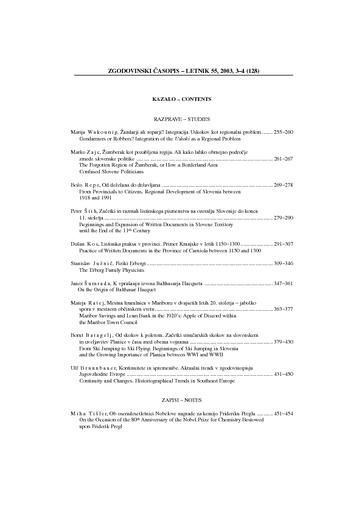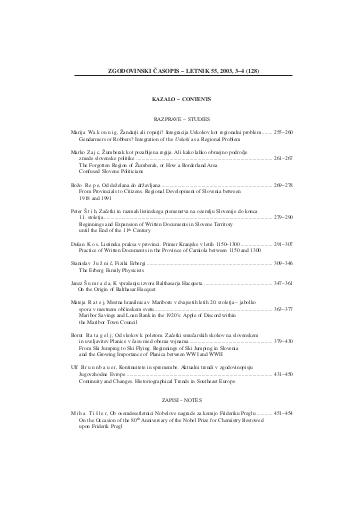
/
Periodicals
/
Zgodovinski časopis
Gendarmers or Robbers?
Integration of the Uskoki as a Regional Problem

Author(s):Marija Wakounig
Co-author(s):Peter Štih (odg. ur.)
Leto:2003
Publisher(s):Zveza zgodovinskih društev Slovenije, Ljubljana
Source(s):Zgodovinski časopis, 2003, št. 3-4
Language(s):slovenščina
Type(s) of material:text
Files (1)

Name:ZC_3-4_-_2003.pdf
Size:10.37MB
Format:application/pdf
Permanent link:https://hdl.handle.net/11686/file52
Description
After the 1526 Mohacs battle and the loss of privileges a part of the Orthodox and Catholic
populations fled from the Ottoman Empire and settled in the Austrian Empire. In 1535, 1538
and 1564 the Habsburg monarchs of Austria promised to reinstate their privileges in return for
their voluntarily, unpaid military service against the Osmanlis. Since the newcomers, named
the Uskoki, had special benefits and were unwilling to adapt to their new surroundings the
relations between them and the autochthonous serf farmers living in this area were far from
good. While on one hand the settlement of the Uskoki in a compact area such as, for instance,
Žumberak, resulted in the protection of their own life-style, on the other they became isolated
from others and, as a consequence, their integration was slowed down. Because of these factors
the former border protectors turned robbers as well.
Metadata (11)
- identifierhttps://hdl.handle.net/11686/5286
- title
- Žandarji ali roparji?
- Integracija Uskokov kot regionalni problem
- Gendarmers or Robbers?
- Integration of the Uskoki as a Regional Problem
- creator
- Marija Wakounig
- contributor
- Peter Štih (odg. ur.)
- subject
- Žumberak
- obmejna področja
- 19. stoletje
- Uskoki
- meje
- Vojna krajina
- politično vprašanje
- description
- After the 1526 Mohacs battle and the loss of privileges a part of the Orthodox and Catholic populations fled from the Ottoman Empire and settled in the Austrian Empire. In 1535, 1538 and 1564 the Habsburg monarchs of Austria promised to reinstate their privileges in return for their voluntarily, unpaid military service against the Osmanlis. Since the newcomers, named the Uskoki, had special benefits and were unwilling to adapt to their new surroundings the relations between them and the autochthonous serf farmers living in this area were far from good. While on one hand the settlement of the Uskoki in a compact area such as, for instance, Žumberak, resulted in the protection of their own life-style, on the other they became isolated from others and, as a consequence, their integration was slowed down. Because of these factors the former border protectors turned robbers as well.
- Po bitki pri Mohaču leta 1526 je del pravoslavnega in katoliškega prebivalstva po izgubi privilegijev zbežal iz Osmanskega cesarstva. Na drugi strani meje so Habsburžani »pribegom«/ Uskokom potrdili 1535, 1538 in 1564 njihove privilegije v zameno za opravljanje (brezplačne) vojaške službe proti Osmanom. Privilegiran položaj Uskokov nasproti podložnemu domačemu kmečkemu prebivalstvu, ter njihova nepripravljenost prilagoditi se okoliščinami v novi »domovini« sta zastrupila ozračje v medsebojnih odnosih. Naselitev Uskokov na strnjenih ozemljih (kot n.pr. Žumberak) je v pozitivnem smislu ščitila način njihovega življenja, v negativnem jih je izolirala in s tem zavirala integracijo. Zunanje ter notranje okoliščine so pogojevale, da so zaščitniki meje postali tudi roparji.
- publisher
- Zveza zgodovinskih društev Slovenije
- date
- 2003
- type
- besedilo
- language
- Slovenščina
- isPartOf
Citirano v (3)
| Tipologija | Avtor(ji) | Naslov | Kraj | Založba | Leto |
|---|---|---|---|---|---|
| 1.01 Izvirni znanstveni članek | Zajc, Marko | Ustvarjanje upravnih meja v Beli krajini | Ljubljana | Inštitut za novejšo zgodovino | 2018 |
| 1.01 Izvirni znanstveni članek | Zajc, Marko | K zgodovini oblikovanja meje v Beli krajini | Ljubljana | Zveza zgodovinskih društev Slovenije | 2010 |
| 2.01 Znanstvena monografija | Zajc, Marko | Kje se slovensko neha in hrvaško začne : Slovensko-hrvaška meja v 19. in na začetku 20.stoletja | Ljubljana | Modrijan | 2006 |
Seznam literature v delu (15)
| Stran | Avtor | Naslov | Vir | Kraj | Založba | Leto |
|---|---|---|---|---|---|---|
| 65 | Simoniti, Vasko | Vojaška organizacija na Slovenskem v 16. stoletju | Ljubljana | Slovenska matica | 1991 | |
| 65 | Bracewell Catherine, Wendy | The Uskoks of Senj : piracy, banditry, and holy war in the sixteenth-century Adriatic | Ithaca | Cornell University Press | 1992 | |
| 65 | Rothenberg Gunther, Erich | The Austrian military border in Croatia, 1522-1747 | Urbana | University of Illinois Press | 1960 | |
| 66 | Rothenberg Gunther, Erich | Die österreichische Militärgrenze in Kroatien 1522 bis 1881 | Wien, München | Herold | 1970 | |
| 66 | Kaser, Karl | Freier Bauer und Soldat : die Militarisierung der agrarischen Gesellschaft in der kroatisch-slawonischen Militärgrenze : (1535-1881) | Wien, Köln, Weimar | Böhlau | 1997 | |
| 68 | Sugar, Peter F. | The Ottoman 'Professional Prisoner' on the Western Borders of the Empire in the Sixteenth and Seventeenth Centuries | Etudes Balkaniques | 1971 | ||
| 69 | Edelmayer, Friedrich | El hermano expulsado : don Fernando | Torre de los lujanes | Madrid | 1999 | |
| 69 | Edelmayer, Friedrich | Cuántos tronos usurpados? Cuestiones sucesorias en la casa de Austria (1500–1531) | Simposio Internacional, Viena 7-11 de marzo de 2000 | Madrid | 2001 | |
| 69 | Edelmayer, Friedrich | Viele usurpierte Throne? : Sukzessionsfragen im Hause Österreich (1500 - 1531) | Karl V. : 1500 - 1558 ; neue Perspektiven seiner Herrschaft in Europa und Übersee | Wien | 2002 | |
| 69 | Tersch, Harald | Österreichische Selbstzeugnisse des Spätmittelalters und der Frühen Neuzeit (1400-1650) : eine Darstellung in Einzelbeiträgen | Wien, Köln, Weimar | Bohlau | 1998 | |
| 69 | Wakounig, Marija | Sigismund von Herberstein | Divus Maximilianus. Una contea per i goriziani 1500-1619 | Monfalcone | Edizioni della Laguna | 2002 |
| 69 | Helbling, Leo | Dr. Johann Fabri: Generalvikar von Konstanz und Bischof von Wien, 1478-1541 | Münster | Aschendorff | 1941 | |
| 69 | Kämpfer, Frank | Siegmund von Herbersteins „Rerum Moscoviticarum Commentarii“ als religionsgeschichtliche Quelle | Siegmund von Herberstein. Kaiserlicher Gesandter und Begründer der Rußlandkunde und die europäische Diplomatie | Graz | 1989 | |
| 69 | Leitsch, Walter | Probleme bei der Edition von Herbersteins Moscovia | Siegmund von Herberstein. Kaiserlicher Gesandter und Begründer der Rußlandkunde und die europäische Diplomatie | Graz | 1989 | |
| 69 | Schwarcz, Iskra | Die Anfänge der russisch-österreichischen Beziehungen im Spiegel der Chroniken und diplomatischen Berichte Ende des 15. Jahrhunderts | Russland und Österreich | Innsbruck | 1999 |